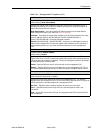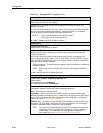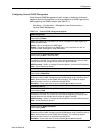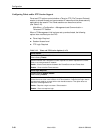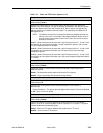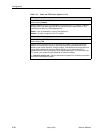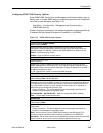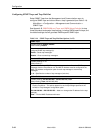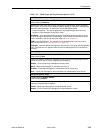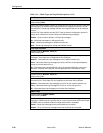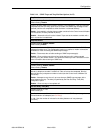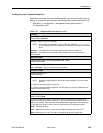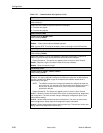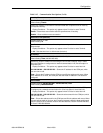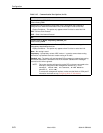
Configuration
3-45
9664-A2-GB20-00
March 2000
Table 3-14. SNMP Traps and Trap Dial-Out Options (2 of 5)
Initial Route Destination
Possible Settings: AutoRoute, COM,
PVCname
Default Setting: AutoRoute
Specifies the initial route used to reach the specified Trap Manager. When proprietary
RIP is active, only one unit in the network needs to specify an interface or management
link as the initial destination. All other units can use the default setting.
Display Conditions
– This option appears for each trap manager specified in the
Number of Trap Managers configuration option.
AutoRoute – Uses proprietary RIP from other FrameSaver devices to learn the route
for sending traps to the specified Trap Manager, or the Default IP Destination when no
route is available in the routing table (see Table 3-9, Node IP Options).
COM – Uses the COM port. This selection is only available when Port Use is set to
Net Link (see Table 3-15, Communication Port Options).
PVCname
– Uses the defined management
linkname
(the name given the Management
PVC). This selection only appears when at least one Management PVC is defined for
the node.
General Traps
Possible Settings: Disable, Warm, AuthFail, Both
Default Setting: Both
Determines whether SNMP trap messages for warmStart and/or authenticationFailure
events are sent to the currently configured trap manager(s).
Disable – Does not send trap messages for these events.
Warm – Sends trap messages for warmStart events only.
AuthFail – Sends trap messages for authenticationFailure events only.
Both – Sends trap messages for both warmStart and authenticationFailure events.
Enterprise Specific Traps
Possible Settings: Enable, Disable
Default Setting: Disable
Determines whether trap messages for enterpriseSpecific events are sent to the
currently configured trap manager(s).
Enable – Sends trap messages for enterpriseSpecific events.
Disable – Does not send trap messages for enterpriseSpecific events.



